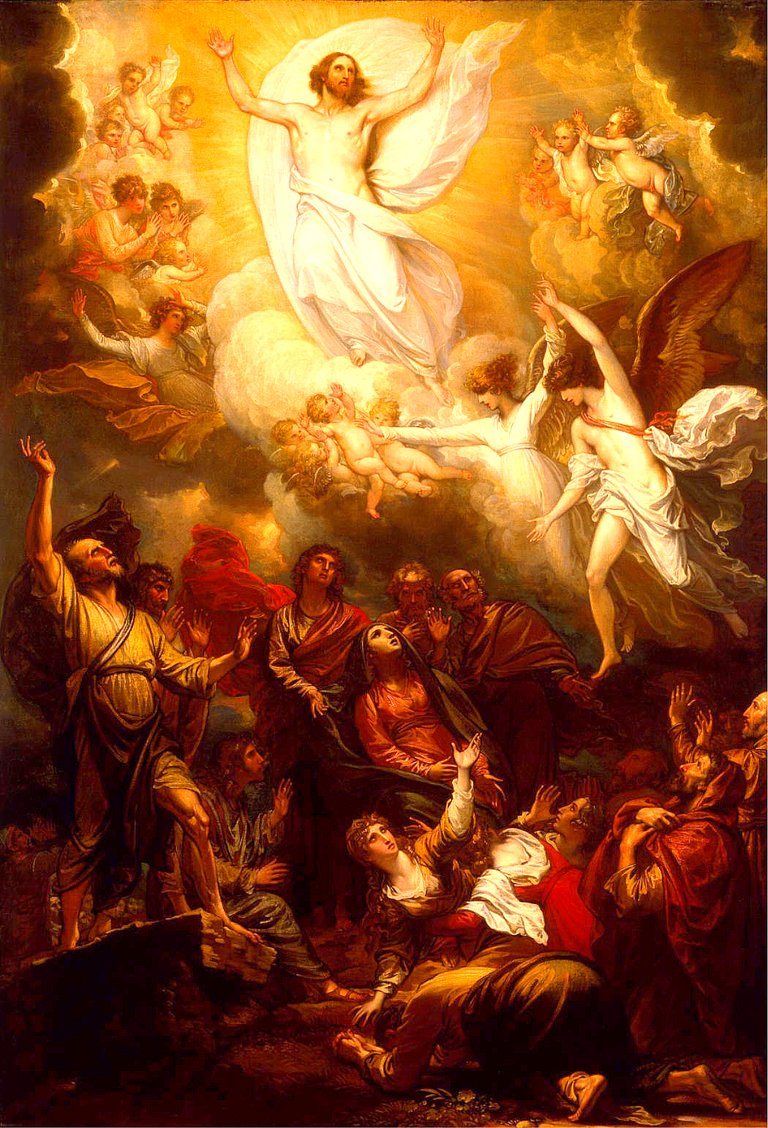
Ascension, by Benjamin West
This morning, on ascension day, before getting up, and resisting the urge to start playing with cellphone and laptop, I prayed my whole daily rosary (up until almost the end I felt miserable, then I felt some rich peace). Afterwards I started praying the daily Divine Mercy Chaplet for a couple we know and their yet unborn baby, as well as my wife and myself. I was entering the third or fourth decade, praying Sor Faustina's prayer:
Eternal Father, I offer You the Body and Blood, Soul and Divinity of Your dearly beloved Son, Our Lord Jesus Christ, in atonement for our sins and those of the whole world.
Praying in Norwegian, I got to Divinity:
Evige far, jeg frembærer for deg din høyst elskedes sønns vår herre Jesus Kristus, Legeme og Blod, sjel og Guddom…
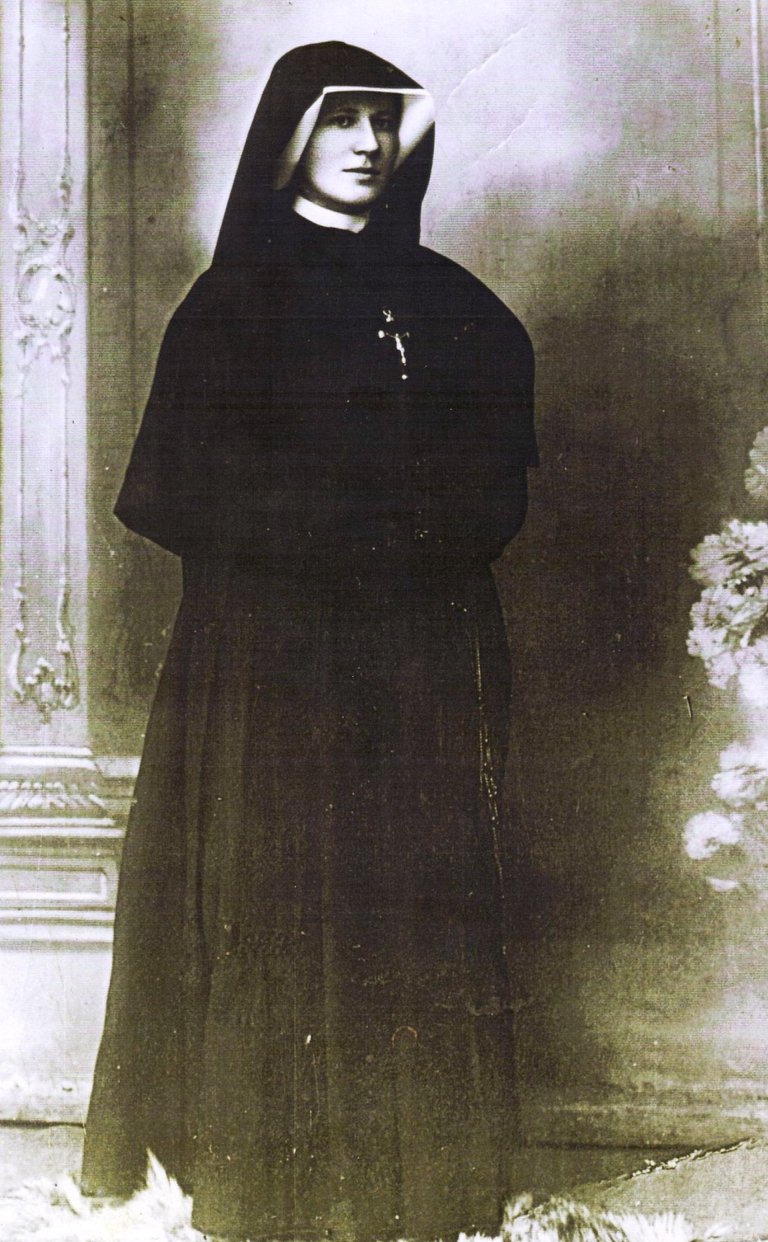
Saint Sor Faustina
Then, I stopped as I sensed a truthful answer lurking to the question Why does Jesus' death on the cross redeem all sins? I have been carrying this question for at least a year. I sensed the truth in the word Guddom/Divinity. I thought about how, when we participate in mass, we offer to God the Father the body and blood of Jesus. But according to the prayer above, we also offer his (human?) soul and his Divinity. I have previously read that Jesus' death on the cross can redeem us because he was God. This explicit mention of carrying forth his Divinity as sacrifice in Sor Faustina's inspired words, confirmed it for me. At this thought, I delved in deeper, as I sensed a truthful answer could be lurked out.
I had a cluster of questions I have contemplated for at least a year: What is a sacrifice? Why do we need to sacrifice something to God? What is the economics of that sacrifice? How does the almost binary principle of sacrifice relate to the rich nature of the human soul of both sin and goodness? How does a binary principle of sacrifice redeem the human nature?
Analogies of Redemption and Higher Order Sacrifice
Regarding Jesus' sacrifice and redemption, I tried to look for a clarifying analogy. This could be one:
Two extended families live close by on a small mountain range. There are times of hunger and necessity. The Saul family has 15 kids and youngsters. The oldest of the youngster is called Emanuel and he is the only experienced shepherd. His father is called Abram and is the family's patriach. The Abel family is equally numerous. Five generations ago both families almost died out after a violent feud between them almost killed all the young men on both sides. Both families swore an oath to respect the other family's property in order to not lose family members to violent conflict between them. Both families have sheep, but times are hard.*
One day, three hungry rebellious boys from The Saul family starts stealing sheep from the Abel family. To cover up the theft, the youngsters tell the rest of the family that the sheep were their own, but that they had fallen off a cliff. The sheep are killed and eaten as the Saul family.
Now the Abel family risks starving. As they discover the theft, the Abel family demands that an equal number of sheep be returned, or they pact will be broken. Out of love for the three youngsters, Abram convinces his son Emanuel to the following: as a sacrifice to make up for the damages done (to both trust and survival chances) and also knowing that his hungry rebellious boys will likely steal again, Emanuel must give himself up as a permanent shepherd serf for the Abel family. He will help them protect their sheep for the rest of his life, and through it perform a continuous sacrifice for his siblings past and future evil acts.

Credit: Sea Kayak Oban
Emanuel's sacrifice is a higher order sacrifice that goes beyond just giving back the same number of sheep stolen. So too is Jesus' sacrifice on a different level. However, it's utility for us humans relies on our shared features with Jesus: self, freedom, spirit and image of God. Without our freedom/self we would be like animals, with no need for redemption and Jesus' sacrifice as God encapsulated human would not make sense, as our need for it spawns from our immutable evil actions committed in free will, and our participation in it relies on our freely accepting it. This acceptance of Jesus' redemption of our sins is evident in the sacraments of Baptism and Confession.
There is a shortcoming to the story above. It does not correctly reflect who we sinned against, only what a higher order sacrifice could be. Because in reality, I am not a wicked youngster who stole sheep from the Abel family.
Instead, I have sinned against the sane purpose of my own nature.
I am like a farmer who threw sulfur in my own well, after being fooled that it would make my cows perpetually sickness-resistant. Instead it gradually degrades both me and my water dependent animals and fields.
I am like the 9 year old gamer and his father's PC. Tired of the legally bought tetris, I illegal download a game with a virus. After a couple of days' fun the computer completely stops working. The only way to fix the computer is to reinstall the operating system.
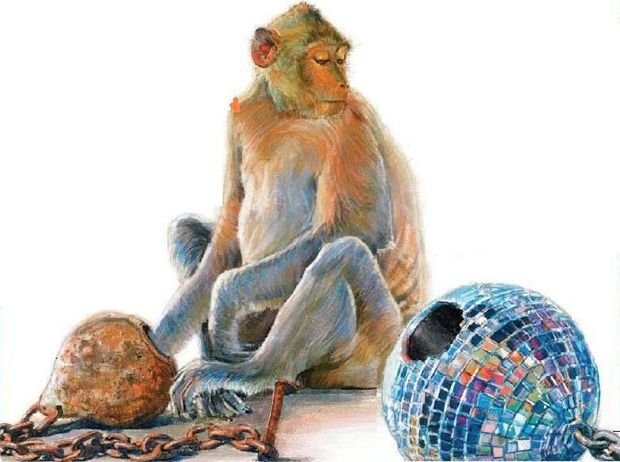
I am like a starving monkey caught by a nut-in-a-tight-jar trap, who, more and more hungry, refuses to let go of the nut.
I am like the hungry wolf licking the hunter's razor sharp knife trap, frenetically aroused by the taste of my own blood.
I am like the billionaire terrified of death after a life of manic indulgence, gradually and immutably replacing my sick limbs and organs with experimental prosthetics, only to find out that the prosthetics quickly corrode under continuous contact with human flesh. However, with my old, rotten body I don't have the surplus time or health to let the scientists correct the corrosiveness through experiments on my body. I will die even faster if they continuously replace the prosthetic software with new experimental versions. My only salvation is that a young, immaculately healthy, crossfit man unjustly accepts the lot of a human guinea pig, which will surely destroy him, but save me and all human race through sickness. Yet, as he die, I will only live if I trust that the prosthetic software upgrades, refined through his ultimate sacrifice, will indeed save me. I must let myself be renewed by the fruits of his sacrifice. Otherwise, I will surely perish. This software upgrade, in order to cooperate with our sick human biology, relies on communicating and sharing data with all other members who have the upgrade. This way our body heals through the accumulated healing of the whole body of participants. It is as if we are part of metaphysical body renewing all of us.
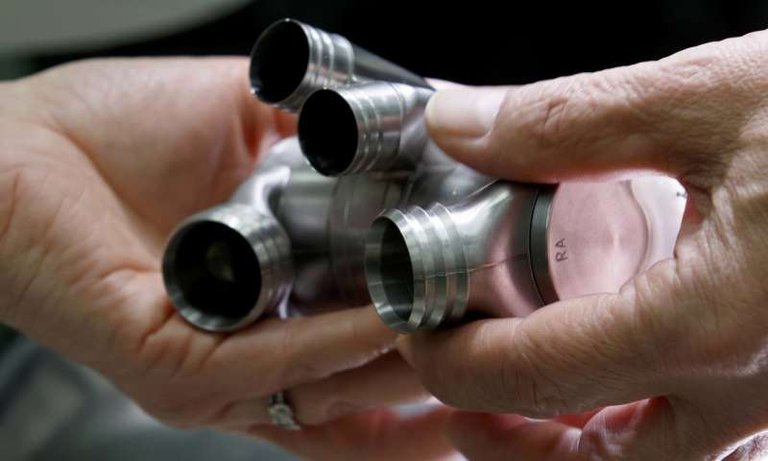
Parts of an artificial heart (Credit OHSU/Kristyna Wentz-Graff)
The prosthetics that gives us our deepest and highest purpose is already in us. It is the image of God, our potential to articulate through our actions and being the Divine Word of Goodness, and the freedom to act or not on this potential. However, we have been born with an inherited buggy beta version of the software that corrodes our soul (and through it our mind and body). This version is, in no small measure, a selfish flesh and a conceited intellect. It refuses to communicate with and learn from other people. Isolated and headstrong it takes on life's challenges on its own and fails with varying degree of misery. The corruption of our soul, mind and body produce ever new variations of challenges, way too complex or way too basic for our conceited intellect. We must humbly accept the wisdom of the upgrade: the communion and participation of our intellect with the loving, healing, higher nature of our Redeemer and the communion of other individual participants.
Sacrifice, Redemption and Freedom
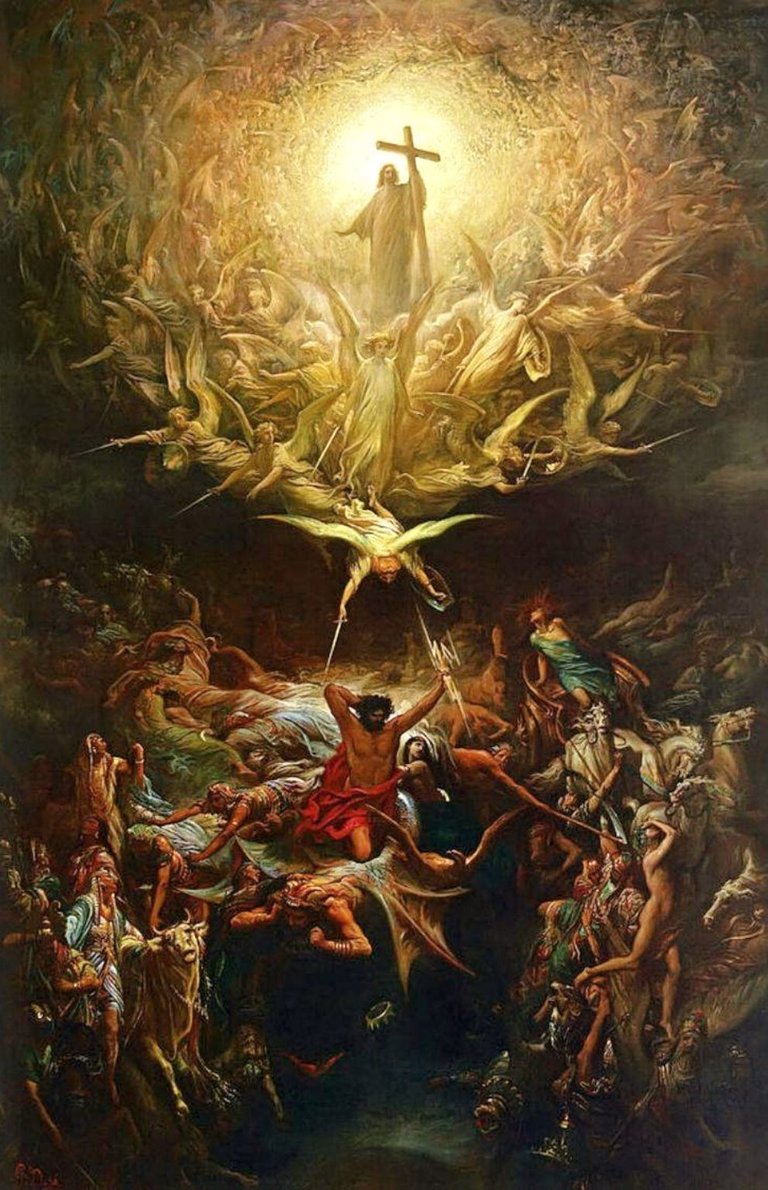
The Triump of Christianity over Paganism by Gustave Doré
Our sacrifice to God is necessary since we have violated the covenant he gave us upon creating us free. He said, roughly:
You are free to participate in articulating the Divine Word.
You are also free to participate in destruction, but this will permanently sever your connection with the eternal love and truth of Divinity.
For the benefit of this world and yourself and the optimal functioning of my Divine plan, keep the promise of not participating in evil.
It is your choice, but now you know the consequences.
Just like with a physical event, the occurence of a human action can never be undone. Once a physical event happens it is immutable like a payment on a blockchain. It can be compensated or balanced. But it's occurence can never be undone. So too with human actions. However, human sin pollutes our soul, mind and body immutably, similar to how sulfur pollutes water (almost) irreversibly, similar to how buggy prosthetics software condemns us to a quicker death.
However, we have not only polluted ourselves, we have also messed up God's plan and the world. No human self-sacrifice can ever redeem the world back to the paradise state, just as a small cup of somewhat clean water cannot unpoison a well.
A fountain of Love, Mercy and Eternal Life
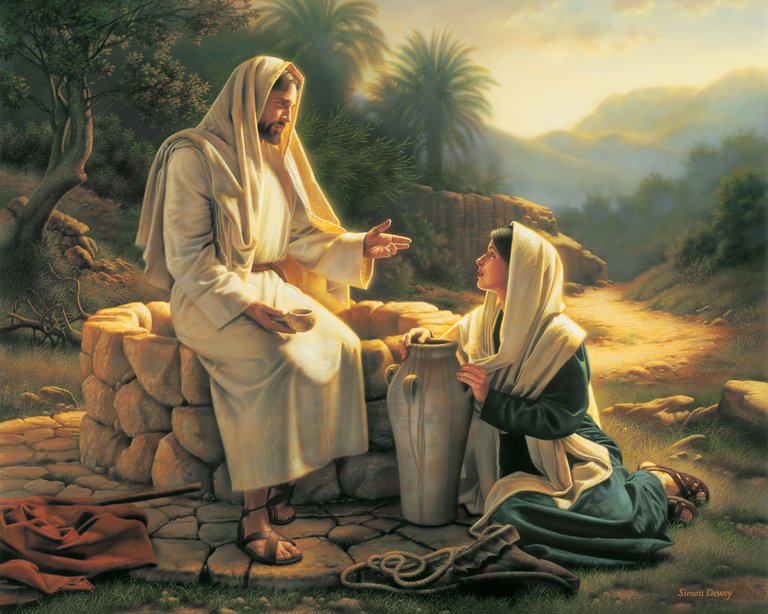
The Samaritan woman at the well
In John 4, Jesus talks about the fountain of eternal life which he gives:
Now he had to go through Samaria. So he came to a town in Samaria called Sychar, near the plot of ground Jacob had given to his son Joseph. Jacob’s well was there, and Jesus, tired as he was from the journey, sat down by the well. It was about noon.
When a Samaritan woman came to draw water, Jesus said to her, “Will you give me a drink?” (His disciples had gone into the town to buy food.)
The Samaritan woman said to him, “You are a Jew and I am a Samaritan woman. How can you ask me for a drink?” (For Jews do not associate with Samaritans.[a])
Jesus answered her, “If you knew the gift of God and who it is that asks you for a drink, you would have asked him and he would have given you living water.”
“Sir,” the woman said, “you have nothing to draw with and the well is deep. Where can you get this living water? Are you greater than our father Jacob, who gave us the well and drank from it himself, as did also his sons and his livestock?”
Jesus answered, “Everyone who drinks this water will be thirsty again, 14 but whoever drinks the water I give them will never thirst. Indeed, the water I give them will become in them a spring of water welling up to eternal life.”
With his sacrifice, Jesus' set up this eternal fount of healing and salvation. It is based on the absolute sacrifice of a Divine, infinite, purely good and just Nature bound up and encapsulated in a temporal constraint. It has redeemed all sins past, present and future, because the Infinite potential and time-infinite nature of the being sacrificed, as well as his emotional adoption of blame for every sin ever, while avoiding to save himself through his infinite power, can rightfully balance out the immutable impact of our sins. But first we have to let go of them. We have to accept the upgraded software. How can we get our darkness balanced out? Because we become part of the mystical body of Jesus. It is as co-participants in his Divine nature of love and justice, that our weight of sins does not drown us. Here, once again, we see the paradox of individual and communion. Only as free individuals can we build a communion. You can feel this in every mass if you contemplate it: we participate together in mass. It is something different than the sum of our individual actions, it is a communion, it is love, it is inadequately praising God in thankfulness through Divinely inspired ritual. But it could not have been done by robots. It is each one of us being both different yet sharing in the human and divine nature that creates the mass. It is true beyond almost any other truth we are aware of.
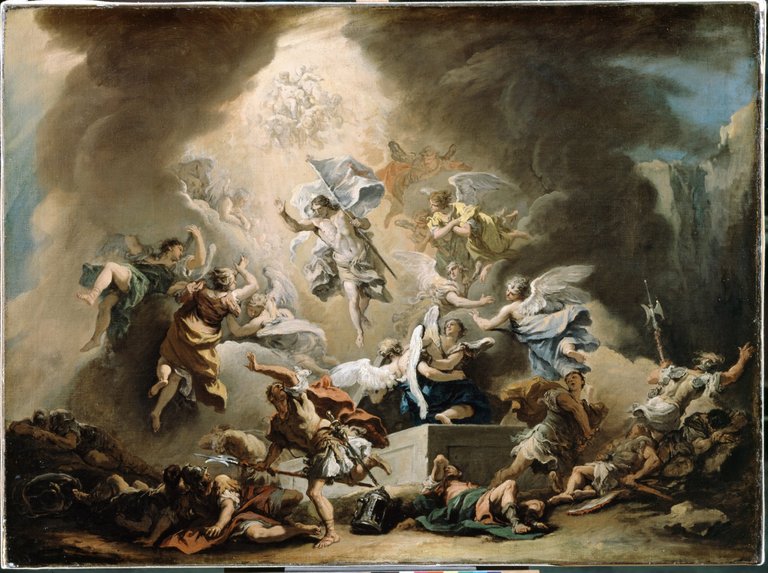
The Ressurection by Sebastiano Ricci
Why did the temporal constraint of the Divine in a human body make a difference? Because it made the sacrifice real. Why did the Divinity encapsulated in the self-sacrificed human body make it different from a human self-sacrifice? Because it was absolutely blameless and all powerful. As Jesus dies a human death, he does not stay dead but conquers death, because his absolute Divinity is more powerful than death itself. It is more powerful because death/corruption/sin/pain/evil is a refusal to participate in the Divine. It is like a dike keeping the ocean from flooding into a field it would naturally occupy. Thus Jesus' Divinity breaks through the isolating dikes of death to reconnect with life itself and the Divine Father. The power of this reconnection can be seen in the resurrection as it blows away the massive stone outside Jesus' grave.
The Pentecostal ICO

Pentecost by Jean II Restout (1692-1768)
Between the resurrection and the ascension day, God has prepared his motley disciples for the Pentecostal ICO of his Mystical Body and Kingdom of Love and Justice. The invitation is opened up to be an owner of Kingdom Coin, giving right to property in the Kingdom of God on Earth and in the Heavenly non-time-constrained dimension. The Holy Spirit helps this implementation of The kingdom of God in the hearts of men and transforms them to mine and disseminate the crypto currency of conversion that the disciples go around offering, giving both astonishing gifts and fruits in our earthly life, and eventually participation in the lovely heavenly existence.
Ascension day according to the Acts of the Apostles 1.3-11:
He had shown himself alive to them after his Passion by many demonstrations: for forty days he had continued to appear to them and tell them about the kingdom of God. While at table with them, he had told them not to leave Jerusalem, but to wait there for what the Father had promised. 'It is', he had said, 'what you have heard me speak about:
John baptised with water but, not many days from now, you are going to be baptised with the Holy Spirit.'
Now having met together, they asked him, 'Lord, has the time come for you to restore the kingdom to Israel?'
He replied, 'It is not for you to know times or dates that the Father has decided by his own authority, but you will receive the power of the Holy Spirit which will come on you, and then you will be my witnesses not only in Jerusalem but throughout Judaea and Samaria, and indeed to earth's remotest end.'
As he said this he was lifted up while they looked on, and a cloud took him from their sight. They were still staring into the sky as he went, when suddenly two men in white were standing beside them, and they said, 'Why are you Galileans standing here looking into the sky? This Jesus who has been taken up from you into heaven will come back in the same way as you have seen him go to heaven.'
On Pentecost, the biggest ICO ever is launched with fire and fury (Acts 2.2-3):
suddenly there came from heaven a sound as of a violent wind which filled the entire house in which they were sitting; and there appeared to them tongues as of fire; these separated and came to rest on the head of each of them.
For the rest of the Pentecost account, see Acts.